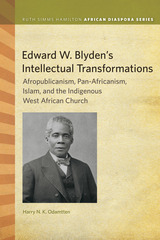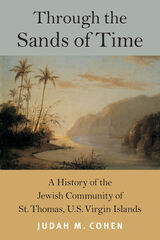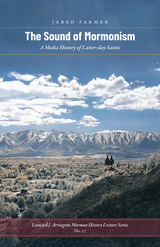Results by Title
2 books about Saint Thomas (United States Virgin Islands)
2 books about Saint Thomas (United States Virgin Islands)

Edward W. Blyden's Intellectual Transformations
Afropublicanism, Pan-Africanism, Islam, and the Indigenous West African Church
Harry N. K. Odamtten
Michigan State University Press, 2019
Distinguished by its multidisciplinary dexterity, this book is a masterfully woven reinterpretation of the life, travels, and scholarship of Edward W. Blyden, arguably the most influential Black intellectual of the nineteenth and early twentieth centuries. It traces Blyden’s various moments of intellectual transformation through the multiple lenses of ethnicity, race, religion, and identity in the historical context of Atlantic exchanges, the Back-to-Africa movement, colonialism, and the global Black intellectual movement. In this book Blyden is shown as an African public intellectual who sought to reshape ideas about Africa circulating in the Atlantic world. The author also highlights Blyden’s contributions to different public spheres in Europe, in the Jewish Diaspora, in the Muslim and Christian world of West Africa, and among Blacks in the United States. Additionally, this book places Blyden at the pinnacle of Afropublicanism in order to emphasize his public intellectualism, his rootedness in the African historical experience, and the scholarship he produced about Africa and the African Diaspora. As Blyden is an important contributor to African studies, among other disciplines, this volume makes for critical scholarly reading.
[more]

Through the Sands of Time
A History of the Jewish Community of St. Thomas, U.S. Virgin Islands
Judah M. Cohen
Brandeis University Press, 2012
In 1796, the Jews of St. Thomas founded the first Jewish congregation on this Caribbean island. By 1803, new arrivals from England, France, and the neighboring islands of St. Eustatius and Curaçao increased the original number from a handful of congregants to twenty-two families. Their small synagogue was destroyed by fires and rebuilt several times. The congregation numbered sixty-four families by the time the present synagogue was erected in 1833. It is by now the oldest synagogue in continuous use under the American flag. The congregation was also among the first to receive copies of the new West London Reform liturgy when it came out in 1841 and the first in this hemisphere to hold a Jewish confirmation ceremony, two years later. In addition, the St. Thomas Synagogue has produced its own unique religious literature relating to hurricanes! While the synagogue has served for over 200 years as a central religious and social gathering place, the Jews of St. Thomas have been highly mobile members of a progressive, cosmopolitan society that at times rivaled any in the world. As an accepted part of the larger community, members were accomplished, model citizens in a highly tolerant Danish colonial society. Jews took positions in government, served as auctioneers, participated in the local Masonic lodges, and represented other countries as consuls in St. Thomas. As traders in a mercantile culture, the Jews contributed to the activity of one of the world’s busiest harbors and played a crucial role in St. Thomas’s nineteenth-century rise to prominence in the northern Caribbean.
[more]
READERS
Browse our collection.
PUBLISHERS
See BiblioVault's publisher services.
STUDENT SERVICES
Files for college accessibility offices.
UChicago Accessibility Resources
home | accessibility | search | about | contact us
BiblioVault ® 2001 - 2025
The University of Chicago Press









